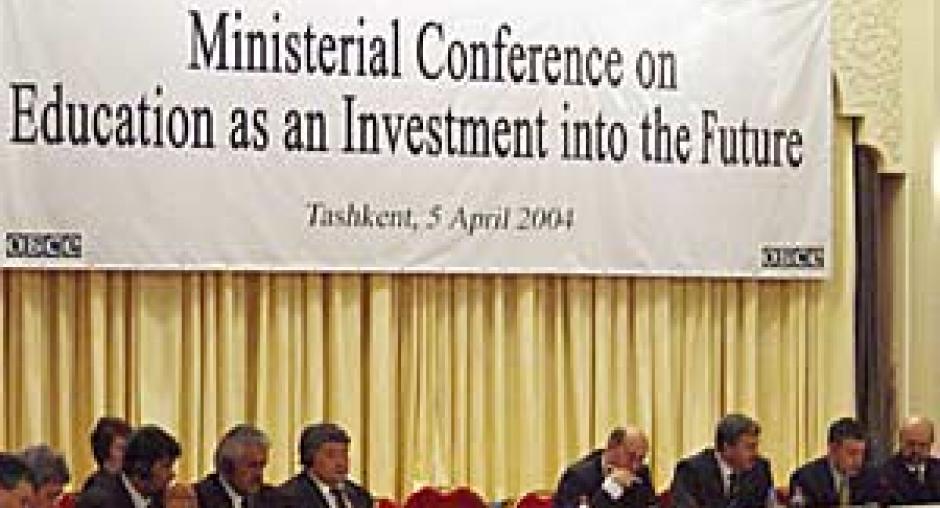Newsroom
Central Asian states discuss future of education
TASHKENT 5 April 2004

(OSCE/Keith Jinks)OSCE Chairman-in-Office Solomon Passy (2nd right) speaks at an international conference on education in Tashkent, 5 April, 2004. (OSCE/Keith Jinks) Photo details
TASHKENT, 5 April 2004 - Today the OSCE Chairman-in-Office, Bulgarian Foreign Minister Solomon Passy, is organizing an international one-day conference in Tashkent entitled "Education as an investment in the Future" jointly with the Government of the Republic of Uzbekistan.
With a view to the next generation, the Conference brings together the ministers of education from Central Asian States and Afghanistan as well as other policy-makers, to take stock of achievements and to discuss the challenges to education reform in the region.
The Chairmanship of the OSCE has identified education as one of the priorities for the activities of the Organization this year. Specifically for the Central Asian region, it is believed that a modern education system with high standards can help foster stability and security, and provide a further impetus to progress towards achieving OSCE standards and ensuring full attention to its principles.
"By prioritizing education," Minister Passy said, "the Bulgarian Chairmanship intends to mobilize national and international political attention to the issue, as well as to activate additional resources, through developing further synergies with relevant partners and raising donor interest, with regard to specific groups and regions. The initiative will cover the whole OSCE area, focusing on specific regional problems and highlighting the issues of common interest."
In particular, the goals of this conference are:
- to share information on the achievements and priorities of Central Asian States within the field of education;
- to discuss national and international approaches to, and activities within, the field of education in Central Asian States;
- to promote and enhance better co-operation among Central Asian States as well as among international institutions active in the region;
- to map out new possibilities for international organizations - and specifically for the OSCE;
- to contribute to the further development of the education sector in Central Asian States.
Representatives from other international organizations, including the World Bank, Asian Development Bank, United Nations Children's Fund (UNICEF) and the International Organization for Migration (IOM), are expected to play a leading role in the discussions and to put forward new ideas. Various academic and research institutions engaged in the region, such as the OSCE Academy in Bishkek, are also participating in the conference.
For additional information please visit the conference web page.
With a view to the next generation, the Conference brings together the ministers of education from Central Asian States and Afghanistan as well as other policy-makers, to take stock of achievements and to discuss the challenges to education reform in the region.
The Chairmanship of the OSCE has identified education as one of the priorities for the activities of the Organization this year. Specifically for the Central Asian region, it is believed that a modern education system with high standards can help foster stability and security, and provide a further impetus to progress towards achieving OSCE standards and ensuring full attention to its principles.
"By prioritizing education," Minister Passy said, "the Bulgarian Chairmanship intends to mobilize national and international political attention to the issue, as well as to activate additional resources, through developing further synergies with relevant partners and raising donor interest, with regard to specific groups and regions. The initiative will cover the whole OSCE area, focusing on specific regional problems and highlighting the issues of common interest."
In particular, the goals of this conference are:
- to share information on the achievements and priorities of Central Asian States within the field of education;
- to discuss national and international approaches to, and activities within, the field of education in Central Asian States;
- to promote and enhance better co-operation among Central Asian States as well as among international institutions active in the region;
- to map out new possibilities for international organizations - and specifically for the OSCE;
- to contribute to the further development of the education sector in Central Asian States.
Representatives from other international organizations, including the World Bank, Asian Development Bank, United Nations Children's Fund (UNICEF) and the International Organization for Migration (IOM), are expected to play a leading role in the discussions and to put forward new ideas. Various academic and research institutions engaged in the region, such as the OSCE Academy in Bishkek, are also participating in the conference.
For additional information please visit the conference web page.
